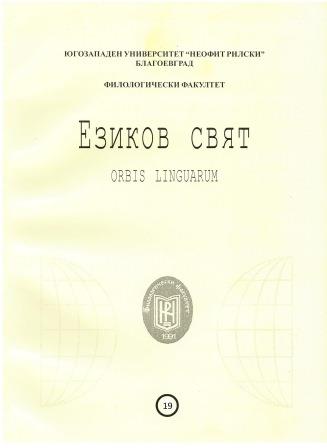BИСШЕТО ХУМАНИТАРНО И СОЦИАЛНОНАУЧНО ОБРАЗОВАНИЕ В УСЛОВИЕ НА КРИЗА – НОВ ПОДХОД ИЛИ УЛИЦА БЕЗ ИЗХОД? ОПИТ ЗА АКТУАЛНА „РЕПЛИКА“ НА ИДЕИТЕ НА Х.Р. ЯУС
THE HIGHER HUMANITIES AND SOCIAL-SCIENTIFIC EDUCATION IN A CRISIS - A NEW APPROACH OR A DEAD END? AN ATTEMPT TO UPDATE A “REPLICA“ OF HANS ROBERT JAUSS 'S IDEAS
Author(s): Boris ManovSubject(s): Social Sciences, Education, Higher Education
Published by: ЮГОЗАПАДЕН УНИВЕРСИТЕТ »НЕОФИТ РИЛСКИ«
Keywords: paradigmatic approach; higher education; crisis; humanities and social sciences
Summary/Abstract: The article develops two problem areas: The first substantiates the thesis that the basis of the “problems“ of the educational process in higher humanitarian education is not the Covid-19 pandemic crisis. This basis lies in the new historical (“human“) situation of the early 21st century. This situation requires the development of modern theoretical models in the humanities and social sciences and a new “propaedeutic“ model for their study. This new model must reject the traditions of “remembering“ and “reproducing“ a certain amount of information by students and provoke their active participation in the educational process. In addition, views on the “secondary“ and / or even the “death“ of humanitarian and social knowledge are asserted. That is why this study, especially at the university, is somehow isolated within the educational space. The second problematic area deals with the question of the essence, content and heuristic-propaedeutic possibilities of the reflexive synoptic paradigmatic approach. The position that the paradigmatic approach overcomes the extremes of the other two main approaches in the reflective methodology of scientific knowledge: philosophical-methodological historicism and contextualism is defended by uniting them in a new “synoptic“ “philosophical contextual“ approach. This view does not allow to present the theory and history of humanitarian and social knowledge as the “chronology“ of its existence, nor only as a linear cumulative process of accumulation of ideas or a set of separate “contextual“ analytical texts, but as a “reconstruction“ which presents a theoretical model of the dialectical “becoming“ of the history and theory of humanitarian and social-scientific thought. This model is the means by which the methodological activity and heuristics of the “synoptic“ paradigmatic approach are “verified“, finding expression not only in the elaboration of the general explanatory scheme, but also in revealing the content of the separate theories, which gives huge opportunities for realization not of “reproducing“, but of “mental“, “creative“ research and educational process.
Journal: Езиков свят - Orbis Linguarum
- Issue Year: 19/2021
- Issue No: 3
- Page Range: 138-148
- Page Count: 11
- Language: Bulgarian

